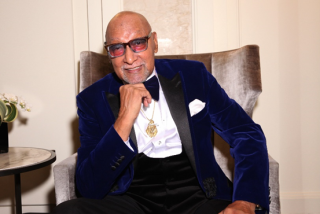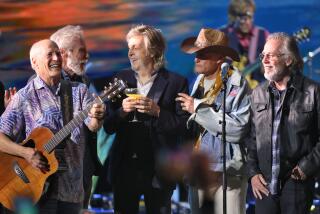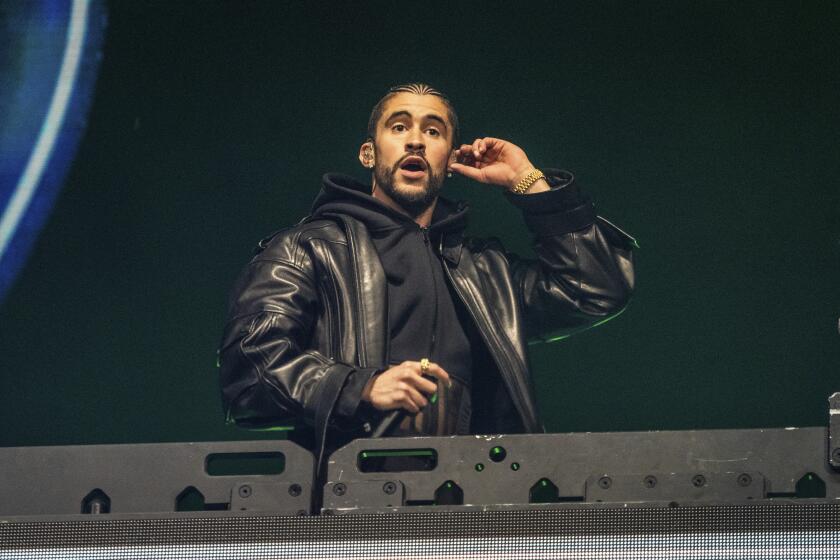JAZZ REVIEW : Duke Tribute Is Genuine Delight
- Share via
ANAHEIM — When Bill Berry plays a “Tribute to Duke Ellington,” as he did Sunday in the Rendezvous Ballroom at the Anaheim Marriott Hotel, authenticity marks the affair.
The 61-year-old cornetist, who toured and recorded with Ellington from 1961 to 1964, not only gathers musicians who can interpret the music of the maestro with appropriate feeling and intensity, but often provides them with arrangements penned by the Duke himself.
And while Berry’s ensemble plays such readily recognizable works as “Take the ‘A’ Train” and “Satin Doll,” he’s not averse to offering arcane Ellingtonia, too. On Sunday, the all-star L.A.-based band treated listeners to “Harlem Air Shaft” and “Rockabye River,” two very infrequently heard pieces from the 1940s.
“River,” a medium slow blues that at times recalled another Ellington classic, “The Mooche,” was a spotlight for saxophonist Jackie Kelso. Usually heard on tenor, Kelso played lead alto instead, filling in for Marshall Royal, who is recuperating from illness.
Kelso coaxed a liquid, robust tone from his horn, and slid between notes as if he were a painter using his brush to smear colors together. As he played, he often held out his notes, as if savoring their flavor. Behind Kelso, the band at one point delivered a punchy counter melody that made the soloist stand out all the more. Kelso also played with grace and delicacy on Billy Strayhorn’s “Blood Count.”
“Satin Doll” was offered twice, to begin the first and second sets. The second version featured saxophonist Joe Romano, one of several bebop-bent stylists in the Berry band whose improvisations brought a modern mode to the proceedings.
Romano, who played lengthy stints with such notables as Woody Herman and Buddy Rich, relayed his naturally swinging efforts with a dark, muscular tone, sometimes barking out low notes, sometimes alternating between intricate flurries and more relaxed passages.
The other tenorist, Herman Riley, was first-rate as well, conjuring up breathy tones on “Mood Indigo” and producing rapid lines on Al Cohn’s “Off and Running,” one of a handful of non-Ellington pieces presented.
Though Berry took a number of solid solos, trumpet honors went to Conte Candoli, one of the finest mainstream jazz soloists around, who was a standout on “Things Ain’t What They Used to Be” and “I Got It Bad,” a vocal spotlight for Dennis Rowland.
On the latter, Candoli began his improvisation with loud notes that grabbed attention, then softened his sound and emitted passages that seemed to spin in place, ideas that ran up the horn and then quickly down, and single-note bursts that were rhythmically power-packed.
Rowland, a distinctive singer whose years with the Count Basie band (1977-84) no doubt account for some of his considerable stage presence, gave his reliant tenor a workout on several tunes each set. He was particularly effective on blues numbers associated with Basie, such as “Goin’ to Chicago,” as his energized shouting melded perfectly with the sizzling band backdrops. His ballad version of “Solitude” also was memorable.
The rhythm section--Frank Capp on drums, Dave Carpenter on bass and George Mesterhazy on piano--bolstered everything the band played, with Capp’s propulsive time feel and thundering breaks a spark plug to the goings-on.
More to Read
The biggest entertainment stories
Get our big stories about Hollywood, film, television, music, arts, culture and more right in your inbox as soon as they publish.
You may occasionally receive promotional content from the Los Angeles Times.









